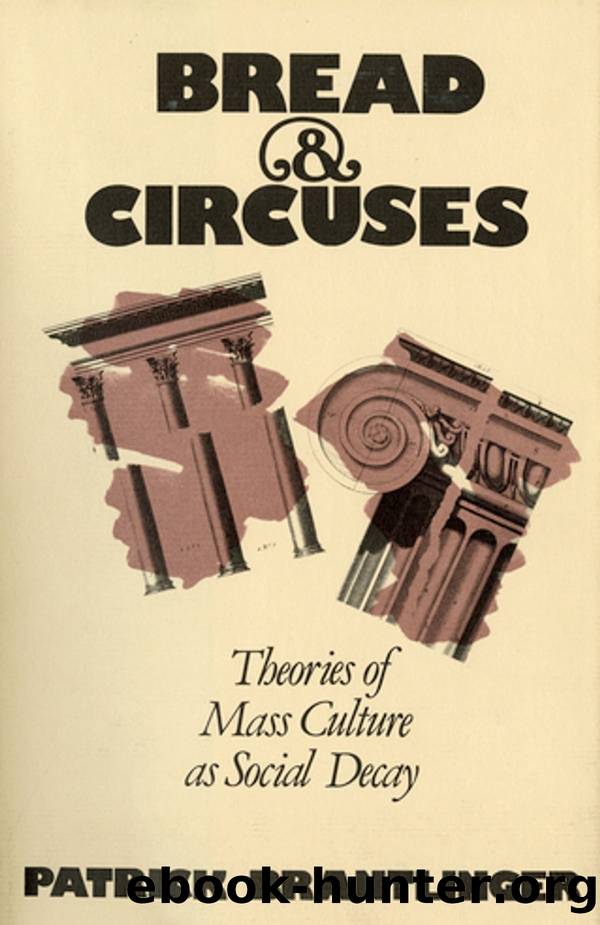Bread & Circuses: Theories of Mass Culture as Social Decay by Patrick Brantlinger & Professor Of English & Cultural Studies Patrick Brantlinger

Author:Patrick Brantlinger & Professor Of English & Cultural Studies Patrick Brantlinger
Language: eng
Format: mobi
ISBN: 9780801415982
Publisher: Cornell University Press
Published: 1983-07-14T21:00:00+00:00
ii
According to the crowd psychologists, the instruments that have evolved since 1789 to shape and express public opinionâthe press, the schools, universal suffrage, the mass mediaâare failures; at best they merely lend the appearance of reason to irrational proceedings, like the imagery of dreams. Although Freud has little to say about mass culture in the narrow sense of the productions of the mass media, his social thinking focuses upon the antithesis between âthe massesâ and âcivilization.â In showing human nature to be mostly determined by the unconscious, and in adapting crowd psychology to his versions of archaeological and sociological explanation, Freud created a powerful fusion of ideas that has influenced all subsequent social theory. Even theorists who reject psychoanalysis have to come to terms with it. Many critiques of mass society and cultureâKaren Horneyâs The Neurotic Personality of Our Time (1937), David Riesmanâs The Lonely Crowd (1950), Alexander Mitscherlichâs Society without the Father (1963), Christopher Laschâs The Culture of Narcissism (1978), to name just a fewâare Freudian to greater or lesser extent. Many others seek to combine psychoanalysis with its apparent opposite, Marxism; works in this category include Wilhelm Reichâs The Mass Psychology of Fascism (1933), Erich Frommâs Escape from Freedom (1942), Theodor Adorno and Max Horkheimerâs The Dialectic of Enlightenment (1944), Herbert Marcuseâs One-Dimensional Man (1964), and Lasch again. And if critics of mass society and culture have been influenced by psychoanalytic thinking, so have the artists and managers who run the mass media. According to the dictum of Leo Lowenthal, âMass culture is psychoanalysis in reverse.â20 This is true in the sense that many of the products of mass cultureâadvertising, for exampleâfunction by stimulating wishful thinking, illusions, the irrational; it is also true in the sense that ad makers, movie directors, television producers, and public relations âimage makersâ all think in Freudian terms and shape their products accordingly.21 An aspect of contemporary mass culture which is obviously psychoanalytic in orientation, furthermore, consists of the hundreds of therapeutic techniques, associations, and cults for personality shaping and adjustment that take their inspiration at least distantly from Freud. Another name for what Cyril Joad, in his investigation of decadence, describes as âthe âpsychologizingâ of morals and thinkingâ is âthe psychological society.â22
As recently as the middle of this century, theories of mass communications and mass audiences were still being framed by references to âcrowd psychology,â âinstincts,â and animal behavior, as in Robert MacIver and Charles Pageâs chapter âHerd, Crowd, and Mass Communicationsâ in their Society: An Introductory Analysis (1949). In an even more reductive fashion, overlaying the modern with the primitive, Elias Canetti in Crowds and Power (1960) ransacks anthropology and psychology to demonstrate the paranoid nature of the social bond itself. Having investigated group behavior and the general irrationality of politics among both primitive and civilized peoples, Canetti turns to Freudâs study of paranoia, the case of Daniel Paul Schreber, for his final model of the psychology of power, and hence for his final model of political organization.23 More recently still,
Download
This site does not store any files on its server. We only index and link to content provided by other sites. Please contact the content providers to delete copyright contents if any and email us, we'll remove relevant links or contents immediately.
Inner Engineering: A Yogi's Guide to Joy by Sadhguru(6778)
The Power of Now: A Guide to Spiritual Enlightenment by Eckhart Tolle(5733)
Fear by Osho(4723)
Ikigai by Héctor García & Francesc Miralles(4222)
The Art of Happiness by The Dalai Lama(4117)
The Ultimate Bodybuilding Cookbook by Kendall Lou Schmidt(3921)
Yoga Therapy by Mark Stephens(3736)
The Little Book of Hygge by Meik Wiking(3673)
The Healing Self by Deepak Chopra(3559)
Why Buddhism is True by Robert Wright(3436)
The Hatha Yoga Pradipika (Translated) by Svatmarama(3311)
Being Aware of Being Aware by Rupert Spira(3263)
Shift into Freedom by Loch Kelly(3187)
Wild Words from Wild Women by Stephens Autumn(3131)
Work Clean by Dan Charnas(3104)
Happiness by Matthieu Ricard(3031)
More Language of Letting Go: 366 New Daily Meditations by Melody Beattie(3015)
Yoga Body & Mind Handbook by Jasmine Tarkeshi(2861)
Why I Am Not a Feminist by Jessa Crispin(2736)
